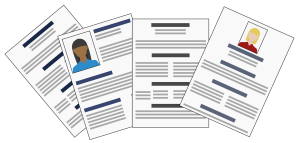Top 3 Career Planning Strategies
Career planning involves the identification of professional opportunities that meet your ambitions in life. A career transition is not as simple as searching for a new job. In most cases, it is a major life-altering decision that impacts your family, lifestyle, and basic survival needs. Before searching for a new career, you need to set long-term goals to pinpoint where you want to be 10 to 20 years down the road. Then you should set short-term goals along the way to ensure that you can feasibly maintain your long-term goals.
There are 3 major steps to the career-planning process that we will cover below so you can be fully prepared to plan your next career transition.
Skills & Interests Assessment
Figuring out what you want to do with your career is the first and most important step of the career planning process. However, if you are not completely sure what career path you are interested in just yet, then you will need to go through some self-testing to have a clear vision. The self-test would include identification of your personality traits, strengths, abilities, and interests to assess the direction you want to take. You can determine these things on your own through various evaluations such as:
- Realizing your value as an employee and determining the salary level you desire.
- Gathering information about personal interests (likes/dislikes), the types of people you want to work with, and your social skills.
- Determining whether you are an introvert or extrovert to understand which personality types you will work best with and in what environments.
- Understanding your willingness to adapt to change and make efforts to accommodate different viewpoints and responsibilities than what you are used to.
You can also consider working with a career coach/counselor to help you better understand and overcome certain objections that may be influencing your career decisions. A career coach can provide more in-depth insight into your skills and abilities by conducting a series of tests/analyses to help determine what career path you should take.
Career Research & Selection
After you have determined the career path you want to take, it’s time to conduct research into these types of jobs and make a selection. You can start by gathering information about each of the careers you want to pursue online and narrowing down your list as much as possible. Keep in mind, when you start to search for jobs, it’s extremely important to be as focused/targeted as possible when preparing a resume and starting to apply. If your resume does not show focus, it will not be very effective for you.
Once you have your list narrowed down, start reviewing job descriptions, salary information, benefits, and educational requirements of each career path to make sure you fit the qualifications. You can also read company reviews from former employees to get an idea of the likelihood that you would enjoy working there. Next, you should try to experiment with some of these careers by doing the following:
- Conducting mock interviews with friends or colleagues by sitting down to answer questions from job descriptions. You can do this by creating your own interview questions, then having the other person interview with you.
- Spend a short period of time observing a professional on the job by requesting to accompany them to work if the employer will allow it. This will help you to better understand the job tasks involved, the environment, and whether or not you will enjoy working in that type of role or industry.
- Consider an internship or part-time work to get your feet wet. This is always a good plan if you are still not completely confident in your abilities.
- Take some higher education or training courses related to the career path you are choosing to make sure you are totally prepared.
Action Planning & Execution
Now it’s time to gather all the information you have and determine your action plan to move forward. The plan should include your employment history, education, professional certifications, skills, and resume preparation to summarize all of this information. Write out each step of your plan to remain organized and so you are prepared to overcome any objections along the way.
Once your action plan is ready, it’s time to execute the plan by starting your job search. Find specific roles and companies that you’re interested in working for and submit your resume to each position. Networking with past colleagues on LinkedIn is also a great tool, as well as uploading your resume to job sites. After you start receiving job offers, you can match them to your own salary, benefits, and interest assessments that you performed earlier in the career planning process.





